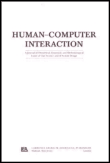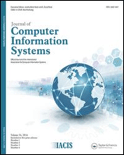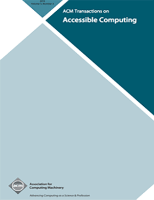
HUMAN-COMPUTER INTERACTION
Scope & Guideline
Fostering Collaboration Between Humans and Machines
Introduction
Aims and Scopes
- User Experience and Interaction Design:
Research that delves into the design and evaluation of interfaces and interactions to improve user engagement, satisfaction, and overall experience. - Assistive Technologies and Accessibility:
Exploration of technologies and systems aimed at supporting individuals with diverse cognitive abilities and disabilities, ensuring inclusivity in technology usage. - Human-Centric AI and Intelligent Systems:
Investigation into the design and implications of AI systems that interact with users, focusing on transparency, ethics, and user acceptance. - Socio-Technical Systems and Contextual Design:
Examination of the broader social and environmental contexts in which technology operates, including user behaviors, cultural impacts, and ethical considerations. - Emerging Technologies and Their Impact:
Analysis of new technological trends such as virtual reality, augmented reality, and brain-computer interfaces, and their implications for human interaction.
Trending and Emerging
- More-than-Human Design:
Research focusing on the integration of non-human elements into design practices, reflecting a shift towards understanding technology in a broader ecological and social context. - AI Ethics and User Interaction:
Increased interest in the ethical implications of AI technologies, particularly how they affect user autonomy, privacy, and trust in automated systems. - Cognitive and Emotional Accessibility:
Emerging emphasis on designing for emotional and cognitive needs, particularly for individuals with disabilities, to enhance user experience and engagement. - Virtual and Augmented Reality Applications:
A significant rise in research around the use of VR and AR technologies, particularly in training, education, and therapeutic contexts, showcasing their potential for immersive user experiences. - Data Privacy and Personal Information Management:
Growing concern and research around how users manage their personal data, privacy challenges, and the implications of data sharing in digital environments.
Declining or Waning
- Traditional Usability Studies:
Research that primarily focuses on basic usability testing and heuristics is becoming less prominent as the field moves towards more complex user interaction paradigms that incorporate emotional and contextual factors. - Static Interaction Models:
The emphasis on fixed models of user interaction is declining, with more researchers exploring dynamic, adaptable systems that respond to user needs in real-time. - Generalized User Profiles:
Studies that rely on broad, generalized user profiles for design are waning as the field shifts towards personalized and context-aware design methodologies. - Desktop-Centric Applications:
Research focusing exclusively on desktop applications is decreasing, as there is a growing trend towards mobile, wearable, and immersive technologies that cater to diverse environments. - Single-Disciplinary Approaches:
The reliance on single-disciplinary perspectives is fading as the journal increasingly encourages interdisciplinary approaches that integrate insights from sociology, psychology, and design.
Similar Journals

JOURNAL OF COMPUTER INFORMATION SYSTEMS
Shaping the Landscape of Computer Information SystemsThe JOURNAL OF COMPUTER INFORMATION SYSTEMS, published by Taylor & Francis Inc, is a prestigious academic journal dedicated to the fields of computer science and information systems. With an ISSN of 0887-4417 and an E-ISSN of 2380-2057, this journal has been a valuable resource since its inception in 1995, contributing to the convergence of research until 2024. The journal holds significant status in its respective categories, achieving a Q2 ranking in Computer Networks and Communications, and a Q1 ranking in Education, demonstrating its impact and relevance to a broad academic audience. With Scopus rankings placing it in the 90th percentile for Social Sciences - Education and respectable standings in Computer Science, it serves as a critical forum for the dissemination of innovative research, methodologies, and case studies within the domains of computer information systems. Although not an open-access journal, it remains a highly cited source, attracting researchers, educators, and professionals seeking to enhance their knowledge and contribute to the evolving discourse in technology and education.

Computers
Innovating Human-Computer InteractionsComputers is a leading journal published by MDPI, dedicated to advancing research in the fields of computer networks and communications, as well as human-computer interaction. Since its inception in 2012, it has established itself as a vital resource for scholars and practitioners, achieving an impressive Q2 ranking in Computer Networks and Communications and a Q3 ranking in Human-Computer Interaction as of 2023. The journal is indexed in Scopus, highlighting its relevance with a rank of #135/395 and #72/145 in their respective categories. Published in Switzerland, this open-access journal ensures widespread dissemination of research findings, supporting the global academic community in enhancing technologies relevant to computer science. Access options are available, fostering an environment where knowledge is shared freely. With an emphasis on innovation, redesign, and collaboration between humans and technology, Computers plays a crucial role in shaping the future of digital interactions.

ACM Transactions on Applied Perception
Advancing Insights at the Intersection of Mind and MachineACM Transactions on Applied Perception is a leading journal published by the Association for Computing Machinery, focusing on the intersection of perception science and computational methods. With an ISSN of 1544-3558 and an E-ISSN of 1544-3965, this esteemed publication has been a vital resource for innovators and researchers since its establishment in 2004. It operates within the ambit of Computer Science and the realms of Experimental and Cognitive Psychology, boasting a commendable impact factor and category rankings, including Q2 in Computer Science (miscellaneous) and Q3 in both Experimental and Cognitive Psychology and Theoretical Computer Science. The journal's scope encompasses a plethora of studies aimed at understanding human perception through computational lenses, making it an essential platform for scholarly exchange. Although it does not currently offer an Open Access option, its extensive reach and rigorous peer-review process ensure high visibility and impact in the academic community. By fostering collaboration across disciplines, ACM Transactions on Applied Perception encourages advancements that bridge perceptual research with practical applications, making it invaluable for researchers, professionals, and students engaged in this dynamic field.

Frontiers in Computer Science
Celebrating innovation and dialogue in the global computer science community.Frontiers in Computer Science is a premier open-access journal published by Frontiers Media SA that has rapidly established itself as a prominent platform for scholarly research in the diverse and evolving field of computer science. With a notable impact factor reflecting its high citation rates, this journal aims to disseminate innovative findings and groundbreaking studies across multiple subdisciplines, including Computer Science Applications, Computer Vision and Pattern Recognition, and Human-Computer Interaction. Since its inception in 2019, and with a consistent trajectory from 2019 to 2024, it has garnered accolades, achieving Q2 ranking in several categories and an impressive Q1 in miscellaneous areas of computer science. Researchers, professionals, and students alike are encouraged to contribute to this dynamic journal that serves as a vital resource for advancing knowledge and fostering collaborative dialogue in the global computer science community. Frontiers in Computer Science is committed to providing open access to research, promoting unrestricted sharing of ideas and fostering innovation at the intersection of technology and society.

International Journal of Mobile Human Computer Interaction
Shaping the evolution of mobile technology through insightful research.International Journal of Mobile Human Computer Interaction (IJMHCI) is a leading scholarly publication dedicated to advancing the field of human-computer interaction in mobile environments. Established by IGI Global, this journal has served as a vital platform for researchers and professionals since its inception in 2009. With a focus on innovative designs, user experience, and the evolving landscape of mobile technology, IJMHCI plays a critical role in bridging theoretical research and practical applications. Though currently categorized in Q4 within the Human-Computer Interaction category for 2023, its consistent publication across the years reflects a commitment to fostering insightful discussions among academia and industry practitioners alike. The journal is indexed in Scopus, ranking #78 out of 145 in its field, highlighting its growing influence. While it does not currently offer open access options, its valuable contributions to mobile HCI research make it an essential resource for students and established researchers striving to explore the complexities of human interaction with mobile technologies.

Human-centric Computing and Information Sciences
Advancing Knowledge for a User-Centric Digital WorldHuman-centric Computing and Information Sciences, published by the Korea Information Processing Society, represents a leading platform in the field of computer science, particularly focusing on the interaction between humans and computational systems. With an impressive Q1 ranking in the 2023 category of Computer Science (miscellaneous) and a commendable Scopus rank of #14/232 (94th percentile), this journal has established itself as a cornerstone for researchers and practitioners dedicated to advancing understanding in this vital area. Understanding the significance of making technology more accessible and effective for users, the journal has been an Open Access publication since 2011, promoting wide dissemination of knowledge without barriers. The journal's scope encompasses innovative methodologies, user experience design, and the integration of human factors into computing environments, making it essential reading for anyone interested in the intersection of technology and society. With all articles freely accessible, the journal not only contributes to scholarly discourse but also encourages collaboration among researchers worldwide, fostering further advancements in human-centric computing.

ACM Transactions on Accessible Computing
Empowering diverse users through innovation.ACM Transactions on Accessible Computing, with ISSN 1936-7228 and E-ISSN 1936-7236, is a prestigious journal published by the Association for Computing Machinery. Established to advance the field of accessible computing, this journal plays a critical role in promoting research that enhances the usability of computer technology for individuals with diverse accessibility needs. Its impact is reflected in its 2023 Scopus rankings, placing it in the Q2 category for Computer Science Applications and Q3 for Human-Computer Interaction, making it a significant resource for researchers and practitioners alike. With an ongoing publication timeline from 2008 through 2024, the journal not only contributes to theoretical advancements but also addresses practical implications in the realm of inclusive design and innovation. Although not Open Access, the journal is a vital forum for disseminating cutting-edge research, ensuring that advancements in technology are accessible to all.

Journal of Usability Studies
Exploring the intersection of technology and user satisfaction.The Journal of Usability Studies, published by the USERS EXPERIENCE PROFESSIONAL ASSOCIATION, is a pivotal platform for researchers and professionals dedicated to advancing the field of usability and user experience design. With an ISSN of 1931-3357, this journal offers a collection of peer-reviewed articles that explore innovative methodologies, emerging technologies, and applied research in usability studies. Though it operates under a traditional access model, the journal remains dedicated to fostering a detailed understanding of how users interact with systems and products. The Journal of Usability Studies is instrumental for those aiming to enhance user satisfaction through research-backed insights, making it a vital resource for academics, practitioners, and students seeking to contribute to the evolving discourse in human-computer interaction and usability engineering.

EUROPEAN JOURNAL OF INFORMATION SYSTEMS
Fostering Excellence in Information Systems and ManagementThe EUROPEAN JOURNAL OF INFORMATION SYSTEMS, published by Taylor & Francis Ltd, stands as a premier platform for groundbreaking research in the domains of Information Systems and Management. With an ISSN of 0960-085X and E-ISSN 1476-9344, this esteemed journal has been at the forefront of academic discourse since its inception in 1995, converging insights and innovative methodologies that reflect the dynamic landscape of information technology. Recognized for its excellence, the journal achieved a Q1 ranking across multiple categories in 2023, including Information Systems and Library & Information Sciences, underscoring its vital role in shaping contemporary research. Operating from the UK, the journal fosters an engaging scholarly community while offering researchers and practitioners insights that drive both theoretical advancement and practical application. Although it does not currently provide open access options, the journal's reputation for high-impact content makes it an essential resource for those who strive to advance the field. With an enduring commitment to quality, the EUROPEAN JOURNAL OF INFORMATION SYSTEMS continues to inform, inspire, and connect the next generation of scholars and professionals.

Intelligent Decision Technologies-Netherlands
Unveiling the Potential of Intelligent Systems for Tomorrow.Intelligent Decision Technologies-Netherlands, published by IOS PRESS, is an emerging journal dedicated to the dynamic fields of Artificial Intelligence, Computer Vision, and Human-Computer Interaction. Established in 2007 and continuing through 2024, this journal aims to foster interdisciplinary research and innovation by providing a platform for cutting-edge studies and applications of intelligent systems. While its current impact factor reflects a growing influence within the scientific community, with quartile rankings ranging from Q3 to Q4 in various pertinent disciplines, Intelligent Decision Technologies plays a pivotal role in shaping future research directions. Although the journal does not offer open access, it remains accessible across academic institutions, encouraging researchers, professionals, and students to contribute to and engage with the latest advancements in decision technologies. With a commitment to quality and relevance, this journal seeks to advance knowledge and enhance the understanding of intelligent systems in today's rapidly evolving technological landscape.